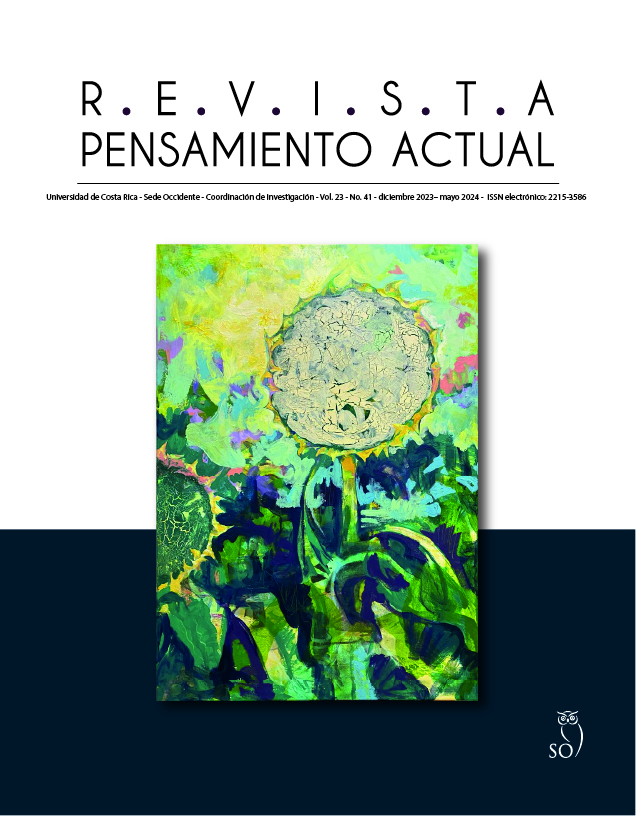Abstract
This article recovers the results of the qualitative research carried out in two educational institutions of the canton of San Ramón where the program of the Ministry of Public Education (MEP) called Night School is applied, specifically with regard to the literacy of young people and adults. This research seeks to answer three questions: Do users of this service receive adequate academic attention for people in vulnerable conditions? Does inclusion apply, during the Covid 19 Pandemic, in the lessons of the Adult Literacy programme; Taking into account that these are human beings who expect to be treated as people with rights and duties? Is emphasis placed as educators of this program, on the importance of knowing about human rights and the different national and international treaties that point towards training on equal terms?
Basic literacy, in this article, will be addressed from the perspective based on human rights and is conceived as one of the principles of integration that promotes human development from the first contributions of Paulo Freire to the Universal Design of Learning (DCD). The methodology presents a design of case studies where the active participation in the process by the researcher allows a comparison of the educational process before and after the Pandemic caused by Covid -19. It suggests the need to publicize the treatment of the program of attention to students and the approach both at the level of pedagogical mediation and educational inclusion. Triangulation through the analysis of the main theories allows to obtain valuable conclusions about the inclusion of these students in society through literacy. Basic literacy, in this article, will be addressed from the perspective based on human rights and is conceived as one of the principles of integration that promotes human development from the first contributions of Paulo Freire to the Universal Design of Learning (DCD). The methodology presents a design of case studies where the active participation in the process by the researcher allows a comparison of the educational process before and after the Pandemic caused by Covid -19. It suggests the need to publicize the treatment of the program of attention to students and the approach both at the level of pedagogical mediation and educational inclusion. Triangulation through the analysis of the main theories allows to obtain valuable conclusions about the inclusion of these students in society through literacy.
References
Castaño, M. (2009). La Educación de Adultos. Innovación y Experiencias Educativas. (24), 2-5.http://docplayer.es/1 9157186-La-educacion-de-adultos.html
Centro Nacional de Recursos para la Educación Inclusiva. (2018). Diseño Universal para el aprendizaje: La plascticidad curricular para la Educación Inclusiva. https://es.scribd.com/document/556506633/Charla-DUA-CENAREC-2018-13
Freire, P. (1996). Pedagogía de la esperanza. Siglo Veintiuno editores.
Guerrero, M. (2012). El Liderazgo para y en la Escuela Inclusiva. Educatio siglo XXI, 30(1), 133-160.
Hernández, R., Fernández, C., y Baptista, P. (2011). Metodología de la investigación. McGraw-Hill.
Instituto Nacional de Estadística y Censos. (2020-2021). Unidad Estadísticas Demográficas: estimaciones y proyecciones de población. https://www.inec.cr/poblacion/estimaciones-y-proyecciones-de-poblacion
Ministerio de Educación Pública. (2016). Apoyos educativos en III ciclo y educación diversificada. [MEP].
Ministerio de Educación Pública. (2006). Antecedentes de los Programas de Educación Abierta.
Nicoletti, A. (2007). Derechos Humanos en el mundo contemporáneo. Revista Iberoamericana de Educación, 42, 1-11. https://rieoei.org/historico/deloslectores/1618Nicoletti.pdf
Programa Estado de la Nación. (2019). Resumen Séptimo informe Estado de la Educación. CONARE. https://estadonacion.or.cr/wp-content/uploads/2019/08/Estado-Educacio%CC%81n-RESUMEN-2019-WEB.pdf
Segura, R. (2021). Riesgos de la exclusión educativa sobre la condición de pobreza de las personas a raíz de la pandemia por Covid- 19. Octavo Informe Estado de la Educación.
Sosa, J. (2003). Paradigmas, enfoques y métodos en la investigación educativa. Investigación educativa, 7(12), 23-40.
UNESCO. (2000). Marco de Acción de Dakar: Educación para todos. Cumplir nuestros compromisos comunes. https://unesdoc.unesco.org/ark:/48223/pf0000121147_spa
UNESCO (2021). Alfabetización para el Desarrollo. https://www.unesco.org/es/articles/alfabetizacion-para-el-desarrollo
Useda, M. (2009). Inclusión social y derecho a la educación. Studiositas, 4(3), 5-8.
##plugins.facebook.comentarios##

This work is licensed under a Creative Commons Attribution-NonCommercial-ShareAlike 3.0 Unported License.
Copyright (c) 2023 Pensamiento Actual


